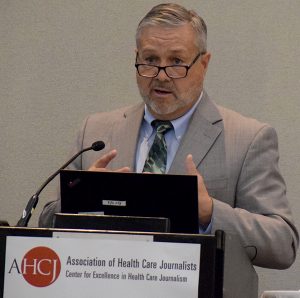
One of the best sessions at Health Journalism 2019 in Baltimore was the panel discussion about drug prices on May 3, “Of price spikes and shortages: New initiatives to increase patient access to generic and biosimilar drugs.” Wendy Wolfson, an independent journalist from Irvine, Calif., moderated the discussion.
Perhaps the most interesting of the four panel members was Martin Van Trieste, president and CEO, Civica Rx, a nonprofit manufacturer of generic drugs for hospitalized patients. Seven of the nation’s largest health systems have invested in Civica and their representatives will serve on its board of directors along with representatives from three philanthropies: the Laura and John Arnold Foundation, the Peterson Center on Healthcare, and the Gary and Mary West Foundation.
As a “disruptive nonprofit,” Civica aims to end the problem of high prices and low supply, Van Trieste said. To do that, the new company and its board members will address what he called, “the root cause of the problem: a broken economic model” in which drug prices “have gone beyond sustainable levels.”
Early this year, prices for all drugs — whether brand-name, specialty, generic, oral or injectable — rose faster than inflation from 2008 to 2016, according to reporting by Dylan Scott at Vox and by Alison Kodjak at NPR.
To bring more generic medications to market, Civica will become an FDA-approved manufacturer that either will make generic drugs itself or subcontract such manufacturing to others. Initially the company wants to offer 14 hospital-administered generic drugs, the first of which will be available later this year, Van Trieste said. He would not name any drugs it will make because competitors could seek to put Civica out of business before those drugs become available for sale, he explained.
One of the reasons some drugs are in short supply is that few companies in the “long, complex, and fragile” drug-supply chain retain inventory, meaning there are no supplies on hand if anything goes wrong among manufacturers, distributors or retailers, he added.
Proclaiming that the company is committed to transparency in how it contracts with hospitals, Van Trieste said Civica will not pay fees or rebates as other drug makers do when seeking preferred placement on formularies.
“We are in favor of competition based on quality, price and supply,” he added.
Although Van Trieste did not say so, one drug Civica might consider making is insulin, which patients with type 1 diabetes need daily. Earlier this week, Emma Davie reported for CBC News that some Americans seeking lower prices for insulin had driven to pharmacies in Canada to get a supply at more affordable rates.
During the panel, Cynthia Rice, senior vice president, advocacy and policy, JDRF (which funds research into type 1 diabetes), explained that the average price of insulin tripled from 2002 to 2013 and has doubled since then. “One in four patients with type 1 diabetes are rationing insulin,” she said. By rationing, these patients risk exacerbating their conditions, driving up health care costs. Health insurers and employers should eliminate deductibles for insulin and use fixed-dollar copayments so that patients could expect to pay the same price for their medications, rather than one that rises depending on how much of the cost third-parties cover.
“More employers are doing so, and that fixes the price for patients with type 1 diabetes,” Rice said.
Among the solutions to the problem of rising drug costs were the use of generic drugs and the effect biosimilars could have. Sarah Dash, director of the Alliance for Healthcare Policy, explained, however, that generic drugs represent only about 22% of total spending in the United States for prescription medications and to date the market for biosimilar medications has been anemic.
In his presentation, Joshua M. Sharfstein, M.D., vice dean for public health practice and community engagement at the Johns Hopkins Bloomberg School of Public Health, suggested that health care journalists pursue the following story ideas:
- Why and how do pharmaceutical companies lobby for higher drug prices?
- Why do prices keep rising, especially for generics?
- Why are higher-priced drugs prescribed more often than lower-priced ones?
- Will the experiment that Civica Rx is running work?
- What are the public health implications of rising drug costs?
- What effect do private equity companies play in raising drug prices?









